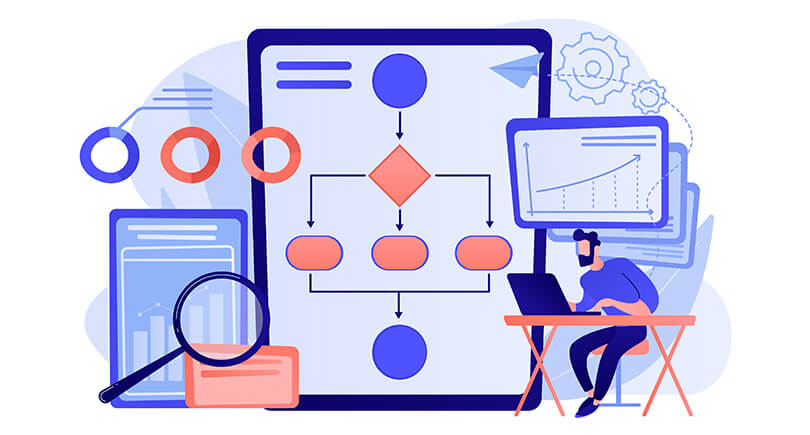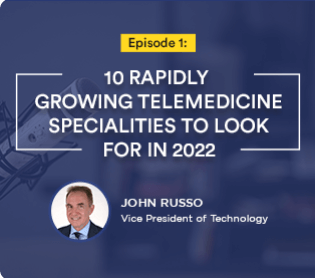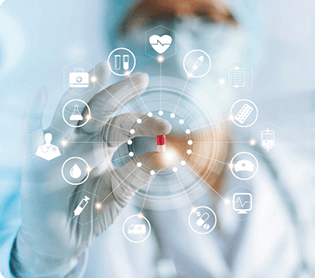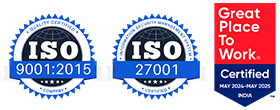Automation is rapidly finding its way into several industries – manufacturing, customer support, transportation, agriculture, and food service. Irrespective of the industry, automation has increased productivity and slashed labor requirements, improving productivity and efficiency.
The same holds for healthcare. Custom healthcare software solutions have given rise to medical automation in large hospitals and smaller practices. These have helped physicians deliver better care and boosted the productivity of non-clinical staff.
Let’s discuss how medical automation systems can benefit healthcare –
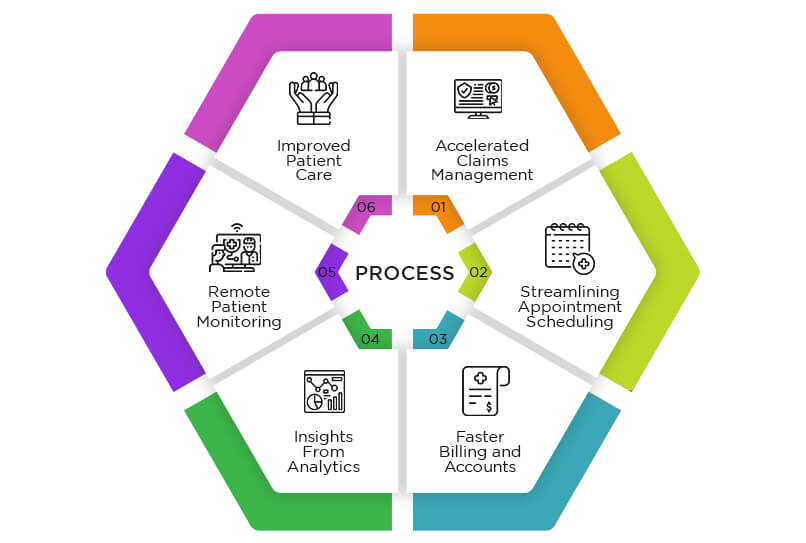
What Are the Benefits of Automated Healthcare Solutions? American healthcare is highly complicated, with numerous regulations subject to change. The entire lifecycle of providing care involves multiple stages, and providers often have to go through an elaborate bureaucratic procedure to get paid. But workflow automation in healthcare irons out the creases in this process.
1. Accelerated Claims Management
Submitting patients’ claims has always been a lengthy, manual procedure involving entering patient data, coding, verification, etc. Moreover, mistakes and rejections lead to re-work, which means providers don’t get paid on time. On the other hand, a healthcare workflow automation solution with a claims functionality can streamline all of the above processes and minimize human intervention. As a result, the entire claims lifecycle becomes free of errors, and the healthcare organization can reduce the number of accounts receivables.
2. Streamlining Appointment Scheduling
Scheduling an appointment with a doctor involves collecting patient data, medical history, examining insurance details, checking physician availability, etc. An elaborate procedure like this is bound to face hold-ups and red tape. Moreover, the medical staff must also inform patients if a doctor suddenly gets called away on an emergency. In light of this, integrated healthcare solutions that incorporate healthcare automation can remove manual work that involves pen and paper. Medical automation systems can gather health information, check if a doctor is available, fix a time, and even reschedule in case of unexpected medical emergencies.
Additionally, automated patient engagement systems can also remind patients of appointments and allow them to reschedule as per their convenience. This has been instrumental in reducing missed consultations. In other words, most of the manual work is automated because of which there is greater speed and efficiency in workflows.
3. Faster Billing and Accounts
Every provider knows the hassles of settling bills and managing accounts. Submission and resubmission of claims, verifying insurance coverage, calculating bills incurred from tests, medication, and physician charges can be tedious for the medical staff to perform manually.
But automation in healthcare can help them consolidate the entire billing workflow into one interface. The result is faster billing, no errors, and smoother payments processing.
In addition to billing, automated healthcare solutions can also aggregate providers’ accounts and financial management processes. This means that looking after overhead, payroll, taxes, etc., is also streamlined into one interface. Such functionalities are handy in practice management solutions where small single-physician practices can efficiently deliver quality care and manage non-medical administration.
4. Insights From Analytics
Every enterprise generates data. Healthcare software product development has led to numerous health information being produced regularly. This data holds important insights about patient health, business processes, and management workflows. But manual analysis of this information is laborious and time-consuming. On the other hand, automated healthcare systems accelerate the analysis and reveal important clues that help providers run their practice better while delivering quality patient care. E.g. –
Analyzing data about the entire claims workflow could reveal where the practice loses revenue from procedures prone to mistakes.
Automation in medical informatics helps clinicians collect, store, and assess patient data to reveal people at greater risk of chronic diseases and begin treatments early.
Automated healthcare solutions have also proven to help clinicians retrieve patient information from different health systems faster. By streamlining electronic data interchange, providers have made informed decisions quicker and delivered better care.
5. Remote Patient Monitoring
Remote patient monitoring (RPM) enables providers to view patient vitals outside traditional medical environments. Automated health solutions have extended the functionality of Remote health monitoring systems. Information from wearable devices can be processed automatically to alert doctors to any variations in patient health. As a result, providers can take a more proactive approach to treat patients with chronic conditions instead of the usual reactive one. This results in improved health care management and medical outcomes. Furthermore, healthcare cloud computing has enabled providers to use advanced telehealth solutions and access patient data from personal devices. This helped doctors to see patients remotely during the Covid-19 pandemic, receive automated updates, and deliver effective care.
6. Improved Patient Care
As the name suggests, automated healthcare solutions automate numerous activities in the overall workflow of care delivery. This minimizes mistakes and helps providers manage the business side of their practice. Moreover, when repetitive paperwork is eliminated with automation in hospitals, it frees up time for the staff to focus on patients. Subsequently, doctors can devote more resources to care and interact with patients. Better patient engagement has been known to impact clinical outcomes directly.
How Do These Advantages Boost Revenue?
Automation in healthcare has been shown to optimize and streamline claims workflow, appointments, accounts, billing, and remote care delivery. In other words, the business aspect of the healthcare industry has seen a giant leap in performance and productivity. In addition to that, the patient-side too is not without benefits. People wouldn’t need to wait for as long with automated healthcare solutions. Reduced wait times directly result in greater access to doctors and doctors being able to see more patients. It is a win-win for all stakeholders involved, as more patients mean more revenue. Coupled with automated health care solutions that reduce administrative overhead, providers spend less to gain more from existing resources.
Conclusion
Automated healthcare is the future. Hospitals and practices have invested increasingly higher amounts of capital in automated health management services. It has been shown to improve the quality of care, boost revenues, improve doctor-patient interaction, and result in better patient experiences. So if you’re a healthcare professional thinking of investing in a medical automation system, think of it as just that – an investment, not an expenditure.
OSP is a trusted software development company that delivers bespoke solutions as per your business needs. Connect with us to hire the best talents in the industry to build enterprise-grade software.
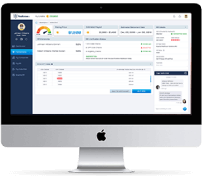
How can we help?
Fill out the short form below or call us at (888) 846-5382
Looking for software solutions to build your product?
Let's discuss your software solutions for your product in our free development acceleration call!
Get In Touch arrow_forwardDiscuss Your Project Handover with a team of expert Book a free consultation arrow_forward
About Author

Written by Riken Shah linkedin
Riken's work motto is to help healthcare providers use technological advancements to make healthcare easily accessible to all stakeholders, from providers to patients. Under his leadership and guidance, OSP Labs has successfully developed over 600 customized software solutions for 200+ healthcare clients across continents.







